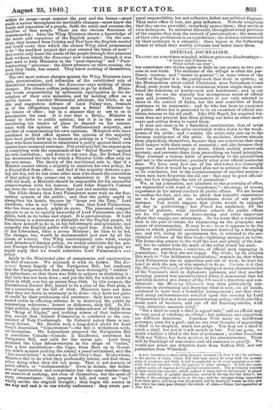OFFICIAL JOURNALISM.
TRADES are sometimes mingled, without grievous disadvantage— "A brewer may Protector be, Which nobody can deny"; but sometimes two trades agree as little in one person as two per- sons in one trade. The stationer of the village is often the per- fumer, toyman, and " turner in general "; in some towns of the North of England it is the pastry-cook that deals in oysters ; in the Metropolitan street called Cleveland, near Tottenham Court Road, some years back, was a tradesman whose single shop com- bined the functions of pastry-cook and hairdresser; and in our own day we see the scarcely less incongruous union of official man and journalist. Your economist is not only selected to share in the control of India, but the said controller of India continues to be economist ; and he who has been an examiner of public affairs but is promoted to be an examiner of official sta- tistics returns to his old craft. Like Old Rapid, his acquired for- tune does not prevent him from picking out holes in other men's coats and sitting down to mend them.
It does not seem to be a 'beneficial combination, that of artist and critic in one. The critic inevitably writes down to the weak- nesses of the artist ; and e contra, the artist only acts up to the foreseen indulgence of the critic. In medicine, doctors abstain from physicking themselves, because they are conscious that they shall tamper with their sense of necessity; and also because they have too much knowledge in detail, which unduly penetrates mystery, and prevents them from prescribing on broad principles.. They contract a vicious habit of prescribing to the peccadilloes and not to the constitution ; precisely what your official journalist does. We have seen how one of the shrewdest has cunningly suggested that it would be a good plan not to criticize the session at its conclusion, but at the commencement of another session— when men have forgotten the old one : that may be good official- ism, but how forgotten the rule of journalism
We, as lay journalists, not admitted to the penetralia of office, are reproached with want of "experience,"—meaning, of course, experience in the actual conduct of public affairs. We are bound. to confess the fact, and also to admit that valuable experiences are to be acquired at the subordinate desks of our public bureaux. You would suppose that clerks would be engaged all day in quilldriving ; but Punch has explained, for the solace of parents, what excellent schools the public offices are for the mysteries of horse-racing and other important affairs that engage our aristocracy. So we learn that a statistical desk is the post of leisure for ruminating on the principles and nature of statesmanship. It may be so : to us it appears to be the place in which political acumen becomes blunted by a drudging use, and wit, losing its spontaneous fire, is subdued to the me- chanical dulness of the blue book—lightning arranged in tables. The house-dog praises to the wolf the ease and plenty of the ken- nel, but he cannot hide the mark of the collar round his neck.
There are precedents, e converso, of official men engaging in journalism ; but they are not happy. The Globe, by its allusion this week to "the Ashburton capitulation," reminds us, that when Lord Palmerston was in opposition and out of work, he kept his hand in with the pen, or was reputed to do so. Certain it is that the Morning Chronicle at that time displayed many characteristics of the Viscount's skill in diplomatic polemics, and that another morning journal was uncontradicted when it announced that his Lordship assisted at a dinner of the Chronicle's reporters and con- tributors : the Morning Chronicle was then particula-ly mis- chievous in obstructing and decrying what is now, on all hands, confessed to have been a beneficial arrangement ; one that obvi- ated many embarrassments entailed upon this country by Lord Palmerston's fast and loose procrastinating policy, which, cat-like, made sport of business, and put off the finishing-stroke, with "coy, reluctant, amorous delay."
"Set a thief to catch a thief is a good rule," and an official may be very good at catching an official ; but criticism and exposition
are different functions. Jonathan Wild made an indifferent governor, even for a gaol; and no one ever thought of appointing a thief to be chaplain, much less judge. You may set a thief to catch a thief, but not to teach morals or law. For our parts, we doubt whether a thief is the best of policemen ; neither Jonathan Wild nor Vidocq has been spotless in his administration. There will be flinchings of conscience and old rancours togratify. We would not select our detective force from Saffron Hill, nor our journalists from Whitehall.


























 Previous page
Previous page